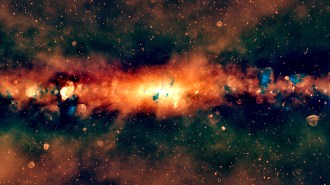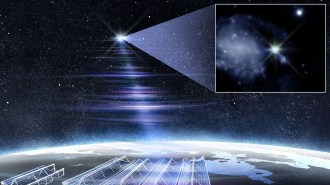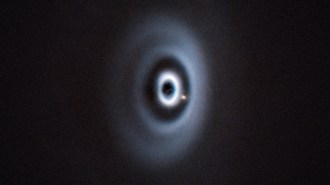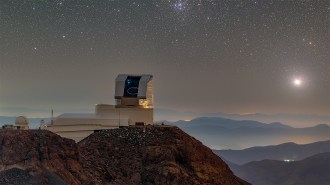Astronomy
-
 Astronomy
AstronomySee the largest, most detailed radio image of the Milky Way yet
Supernova remnants, stellar nurseries and more populate the new edge-on view of the Milky Way as seen from Earth’s southern hemisphere.
-
 Astronomy
AstronomySome planets might home brew their own water
Tests on olivine hint that water-rich exoplanets could generate H2O internally, possibly explaining ocean worlds and even some of Earth’s early water.
- Astronomy
Astronomers saw a rogue planet going through a rapid growth spurt
The growth spurt hints that the free-floating object evolves like a star, providing clues about rogue planets’ mysterious origins.
- Astronomy
See a 3-D map of stellar nurseries based on data from the Gaia telescope
The map, spanning 4,000 light-years from the sun in all directions, combines a chart of space dust with the effects of a rare type of young, hot star.
- Space
This black hole flipped its magnetic field
Event Horizon Telescope data reveal the magnetic field around M87* shifted, weakened and then flipped, defying theoretical expectations.
-
 Particle Physics
Particle PhysicsA primordial black hole may have spewed the highest energy neutrino ever found
The Big Bang may have spawned these theoretical black holes, whose lives are thought to end in a burst of extremely energetic particles.
-
 Space
SpaceHow a Harvard maverick forever changed our concept of the stars
At just 25, Cecilia Payne-Gaposchkin applied quantum physics to a treasure trove of astronomical observations to show that stars are mostly hydrogen and helium.
By Elise Cutts -
 Astronomy
AstronomyAstronomers detect the brightest ever fast radio burst
The fast radio burst came from 130 million light-years away. That proximity allowed an in-depth search for what produced the mysterious signal.
-
 Astronomy
AstronomyA newborn planet munches on gas and dust surrounding its host star
In a first, astronomers imaged a baby planet within a gap in the disk of material around a star, confirming predictions about how rings form.
- Planetary Science
NASA’s Webb telescope spotted a new moon orbiting Uranus
Like Uranus's other 28 moons, the newfound object spotted by JWST will be named after a William Shakespeare or Alexander Pope character.
-
 Space
SpaceThe Vera Rubin Observatory is ready to revolutionize astronomy
Sporting the world’s largest digital camera, the new telescope is poised to help solve some of the universe’s biggest mysteries.
- Astronomy
A dying star revealed its heart
Before exploding, a star shed most of its layers, giving a glimpse at a massive star’s deep interior. The event may represent a new kind of supernova.